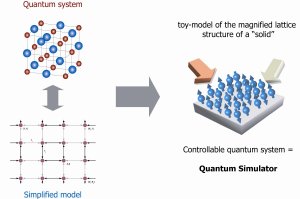Oct 2 2009
Using quantum systems to simulate other quantum systems could resolve some of the problems scientists face in quantum mechanics. A review in Science this week (Friday October 2nd) outlines the main theoretical and experimental aspects of quantum simulation and emphasizes some of the challenges and promises of this fast-growing field.

Richard Feynman proposed in the early 80s: ‘Let the computer itself be built of quantum mechanical elements which obey quantum mechanical laws.’
Such quantum simulation could allow researchers to tackle problems in fields such as condensed matter physics, high-energy physics, atomic physics, quantum chemistry or cosmology. It could be implemented using quantum computers, but also with simpler, analog devices which would require less control, and therefore, would be easier to construct.
Iulia Buluta and Franco Nori of the RIKEN Advanced Science Institute, present an overview of how quantum simulators may become a reality in the near future. They pinpoint future directions and argue that the technologies are now within reach.